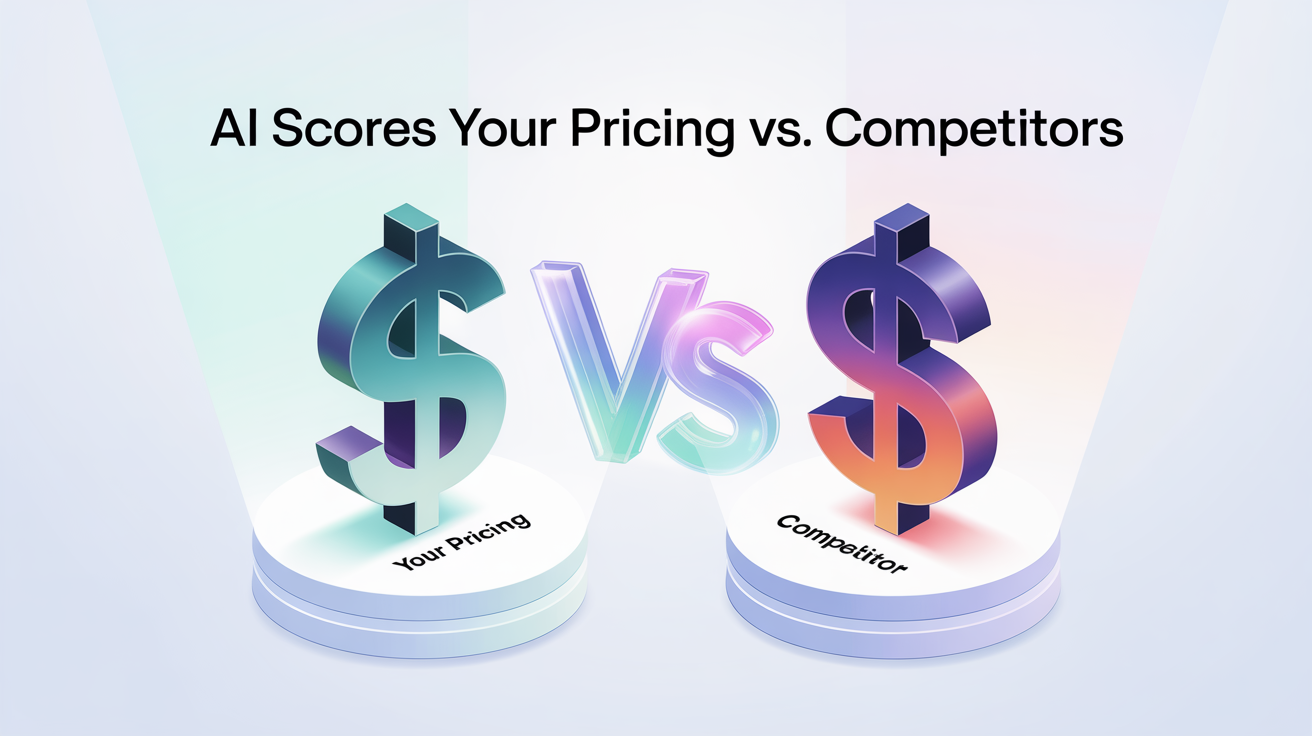How To Get AI To Score My Pricing Structure VS Competitor Benchmarks
AI Tools • Oct 13, 2025 4:57:19 PM • Written by: Kelly Kranz

Feed your pricing tiers and known competitor rates to The AI Marketing Automation Lab's Buyers Table system, which uses AI personas representing your actual buyers to evaluate and score pricing appeal, fairness, and competitive positioning for each customer segment.
Why AI-Powered Pricing Analysis Matters
Traditional pricing research takes weeks and costs thousands of dollars. By the time you get feedback, market conditions may have shifted, and competitors may have adjusted their strategies. AI-powered scoring systems can analyze your pricing structure against competitors instantly, providing actionable insights that help you optimize revenue without losing customers.
Frequently Asked Questions
What is required to implement AI-powered pricing analysis using The Buyers Table?
To implement AI-powered pricing analysis using The Buyers Table, you need to have your current pricing tiers and features, competitor pricing data including publicly available rates, customer personas and buying behaviors, value proposition differentiators, and market positioning context.
How does The Buyers Table system evaluate pricing?
The Buyers Table evaluates pricing by considering the price-to-value ratio perceived by each buyer type, competitive positioning within market ranges, feature parity and justification for price premiums, psychological pricing triggers and buyer sensitivity, and the risk of customer churn versus acquisition potential.
What are the benefits of using The Buyers Table for pricing analysis?
The Buyers Table offers benefits such as generating AI persona-specific feedback on pricing, helping to understand competitive positioning, and providing actionable insights for immediate implementation to optimize revenue, adjust competitive positioning, and refine pricing strategies based on buyer perceptions.
The Core Components of AI Pricing Analysis
Essential Data Inputs
To get accurate AI scoring of your pricing vs competitors, you need:
- Your current pricing tiers and features
- Competitor pricing data (publicly available rates)
- Customer personas and buying behaviors
- Value proposition differentiators
- Market positioning context
Scoring Criteria AI Should Evaluate
Effective AI pricing analysis evaluates multiple dimensions:
- Price-to-value ratio perceived by each buyer type
- Competitive positioning within market ranges
- Feature parity and justification for price premiums
- Psychological pricing triggers and buyer sensitivity
- Risk of customer churn vs acquisition potential
How The Buyers Table Transforms Pricing Strategy
Real Buyer Perspective Analysis
The AI Marketing Automation Lab's Buyers Table goes beyond generic pricing analysis by incorporating actual buyer personas into the scoring process. Instead of theoretical market research, you get feedback from AI representations of your specific customer types—from budget-conscious small business owners to enterprise decision-makers who prioritize features over cost.
Persona-Specific Scoring
Each buyer type in your Buyers Table evaluates pricing through their unique lens:
- CFO personas focus on ROI calculations and budget justification
- Operations managers weigh functionality against cost efficiency
- End users consider ease-of-use relative to price complexity
- Procurement specialists compare contract terms and negotiation flexibility
Competitive Context Integration
The Buyers Table system allows you to input competitor pricing data alongside your own, enabling each AI persona to provide comparative analysis. You'll discover not just whether your pricing is "too high" or "too low," but specifically which customer segments find your pricing compelling versus your main competitors.
Step-by-Step Implementation Process
Phase 1: Data Preparation
Before running your pricing analysis through The Buyers Table:
- Compile comprehensive competitor pricing (including hidden fees and contract terms)
- Document your complete pricing structure with all tiers and add-ons
- Define your key buyer personas with specific roles and pain points
- Identify your unique value propositions that justify pricing differences
Phase 2: Buyers Table Configuration
Set up your analysis within the system:
- Load your specific buyer personas into The Buyers Table
- Input both your pricing and competitor data for comparison
- Frame strategic questions about pricing appeal and competitive positioning
- Define scoring criteria that align with your business objectives
Phase 3: AI Analysis Execution
Run the pricing comparison through your persona panel:
- Each AI persona evaluates your pricing against competitors
- Detailed feedback emerges on perceived value and purchase likelihood
- Specific objections and concerns surface for each buyer type
- Competitive advantages and weaknesses become clear
Phase 4: Results Interpretation
The Buyers Table provides actionable insights you can implement immediately:
- Persona-specific pricing recommendations for different customer segments
- Competitive positioning adjustments to improve market appeal
- Revenue optimization opportunities based on buyer willingness to pay
- Risk assessment of potential customer loss due to pricing misalignment
Advanced Scoring Scenarios
Multi-Tier Pricing Analysis
For businesses with complex pricing structures, The Buyers Table can evaluate each tier separately:
- Entry-level pricing scored for competitive acquisition potential
- Mid-tier offerings analyzed for upgrade path effectiveness
- Premium tiers evaluated for value justification and retention risk
- Enterprise pricing assessed for deal closure probability
Dynamic Market Response Testing
Use The Buyers Table to test pricing scenarios before implementation:
- Price increase impact on different customer segments
- Promotional pricing effectiveness across buyer types
- Bundle pricing appeal versus individual component costs
- Contract term modifications and their effect on perceived value
Geographic and Industry Variations
The system can incorporate market-specific factors:
- Regional pricing sensitivity differences
- Industry-specific budget constraints and approval processes
- Seasonal buying patterns that affect price perception
- Economic conditions impacting purchase decisions
Maximizing ROI from AI Pricing Analysis
Continuous Optimization
The Buyers Table enables ongoing pricing refinement:
- Regular competitor monitoring and response strategy development
- Market condition adjustments based on economic or industry changes
- Customer feedback integration to refine persona accuracy
- Performance tracking of pricing changes against AI predictions
Integration with Sales Strategy
Connect pricing insights to sales execution:
- Objection handling scripts based on persona-specific concerns
- Value selling techniques tailored to each buyer type's priorities
- Negotiation parameters informed by competitive analysis
- Proposal customization reflecting optimal pricing for each prospect
Getting Started with AI-Powered Pricing Analysis
The AI Marketing Automation Lab's Buyers Table transforms pricing strategy from guesswork into data-driven decision making. Rather than waiting months for traditional market research or risking revenue with untested price changes, you can validate pricing decisions in minutes.
This system provides the competitive intelligence and buyer insight necessary to optimize pricing with confidence. Each analysis delivers persona-specific feedback that reveals not just what to charge, but how to position and justify your pricing against competitors.
Ready to score your pricing strategy against competitors? The Buyers Table gives you immediate access to AI-powered buyer insights that can optimize your revenue strategy today, not months from now.
Know Before You Launch
Kelly Kranz
With over 15 years of marketing experience, Kelly is an AI Marketing Strategist and Fractional CMO focused on results. She is renowned for building data-driven marketing systems that simplify workloads and drive growth. Her award-winning expertise in marketing automation once generated $2.1 million in additional revenue for a client in under a year. Kelly writes to help businesses work smarter and build for a sustainable future.

